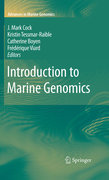
Marine biology has always played an important role in biological research, being at the origin of many key advances. To a certain extent, the influence of marine biology on the biological sciences was overshadowed over a period of several years by the remarkable advances that were made using powerful model organisms from terrestrial environments. This situation is now changing again, however, due primarily to spectacular developments in genomic methodologies thathave significantly accelerated research in a broad spectrum of marine biologydisciplines ranging from biodiversity to developmental biology to biotechnology. The data generated by marine genomics projects have had an impact on questions as diverse as understanding planetary geochemical cycles, the impact of climate change on marine fauna and flora, the functioning of marine ecosystems,the discovery of new organisms and novel biomolecules, and investigation of the evolution of animal developmental complexity. INDICE: Preface 1/ Genomics in the discovery and monitoring of marine biodiversity 2/ Metagenome analysis 3/ Populations and Pathways: Genomic approaches to understanding population structure and environmental adaptation. 4/ Phylogeny of animals: genomes have a lot to say 5/ Metazoan complexity 6/ Genomics of marine algae 7/ Genomic approaches in aquaculture and fisheries 8/ Marinebiotechnology 9/ Practical guide: genomic techniques and how to apply them tomarine questions Glossary.
- ISBN: 978-90-481-8616-7
- Editorial: Springer
- Encuadernacion: Cartoné
- Páginas: 399
- Fecha Publicación: 01/05/2010
- Nº Volúmenes: 1
- Idioma: Inglés
